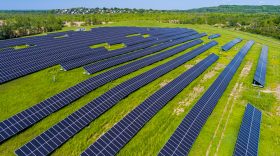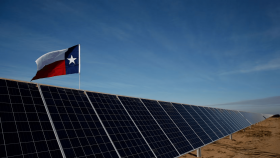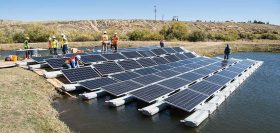The Chinese government and domestic PV firms have responded to the Department of Commerce’s preliminary ruling to apply tariffs to Chinese PV imports.
The ruling is in response to a petition filed by the Coalition for American Manufacturing (CASM), an industry group alleging that Chinese firms have profited from illegal government subsidies, and that Chinese firms have been dumping panels on the U.S. market below cost.
The tariffs – of between 2.9 and 5 percent – only address the first complaint, and apply only to Chinese made solar cells. Panels assembled in China using cells produced elsewhere will not be subject to tariffs.
China’s biggest solar manufacturers quickly came out to claim that the low tariff levels indicate U.S. reluctance to impose measures considered to be too punishing.
“This initial decision reflects the reality that Suntech’s global success is based on free and fair competition. Nonetheless, unilateral trade barriers, large or small, will further delay our transition away from fossil fuels,” said Andrew Beebe, Suntech’s Chief Commercial Officer, whose firm was slapped with countervailing duties of 2.9 percent.
Beebe went on to highlight the firm’s links to the U.S. “As a local manufacturer with production in Arizona, we will continue to remain an active member of the American solar industry and maintain focus on making solar energy affordable for everyone, everywhere,” he said.
Yingli Green Energy, whose PV cells face a 3.6 percent import tariff, also emphasized the firm’s job creation efforts in the U.S., and downplayed the efficacy of tariffs as a method to impact Chinese producers only.
“The important thing to remember is that tariffs are bad for the entire solar industry,” said Mr. Liansheng Miao, Chairman and CEO of Yingli Green Energy. “We will continue to support the U.S. as an important solar market, and believe that global trade and fair competition will persevere. Today’s decision validates that.”
Trina Solar, whose PV products may face a 4.73 percent tariff, echoed the other firms’ sentiments, and focused on the fact that the Commerce ruling was only preliminary.
An Official Response
A commentary on Xinhua, the official Chinese government news agency, said that the “lighter than expected tariffs” really aim to keep the U.S.-China trade relationship from going sour. Nevertheless, the commentary said, the U.S. is acting in a protectionist manner.
“Although the solar panel case has proven to be less devastating than expected, the U.S. government recently intensified shots against a range of Chinese imports… recalling the phantom of protectionism in an election year.”
“When conducting subsidy and dumping probes, the U.S. government should make decisions based on facts,” the commentary continued. “Punitive duties, big or small, will distort normal trade relations and risk disturbing the fragile global economic recovery process”
Chinese foreign ministry spokesman Hong Lei echoed this view, according to AFP. “It is normal for the two sides to have friction and differences of views,” he said.
“We should not allow such friction to impair the sound development of Sino-US economic relations.”
But some believe that China’s solar supply boom may slow down, taking pressure off PV producers in the U.S. and elsewhere. Speaking to the Los Angeles Times, Huang Ming, chairman of Himin Solar Energy Group, predicted that half of China’s panel producers will soon shut down, and that 95 percent of firms are now operating at a loss.
According to Xinhua, the China Chamber of Commerce for Import and Export of Machinery and Electronic Products said the ruling was unfair, and that “Chinese solar panel makers firmly believe that their commercial success resulted from fair competition rather than unfair trade practices and violations to WTO rules.”
Ming agrees that government subsidies were not the source of these firms’ success. “Why are Chinese products so cheap? You can ask the same question in the textile industry, automobile industry and machinery industry,” he said. “It’s all the same.”
Looking Forward
According to the Los Angeles Times, Liu Baocheng, a professor at the University of International Business and Economics in Beijing, believes that the tariffs will lower the temperature of the brewing trade war.
“I don’t think China will retaliate,” Liu said. “They won’t politicize this issue. They’ll probably play this down as a technical issue.”
With all sides claiming victory in the U.S., and the Chinese expressing only limited outrage, the end of this chapter is not yet near. On May 17, Commerce will announce a preliminary ruling on whether to levy an anti-dumping tariff on Chinese imports, too. CASM has requested a tariff of up to 100 percent.
But these decisions will remain tentative until the U.S. International Trade Commission also completes its investigation by the end of 2012.





